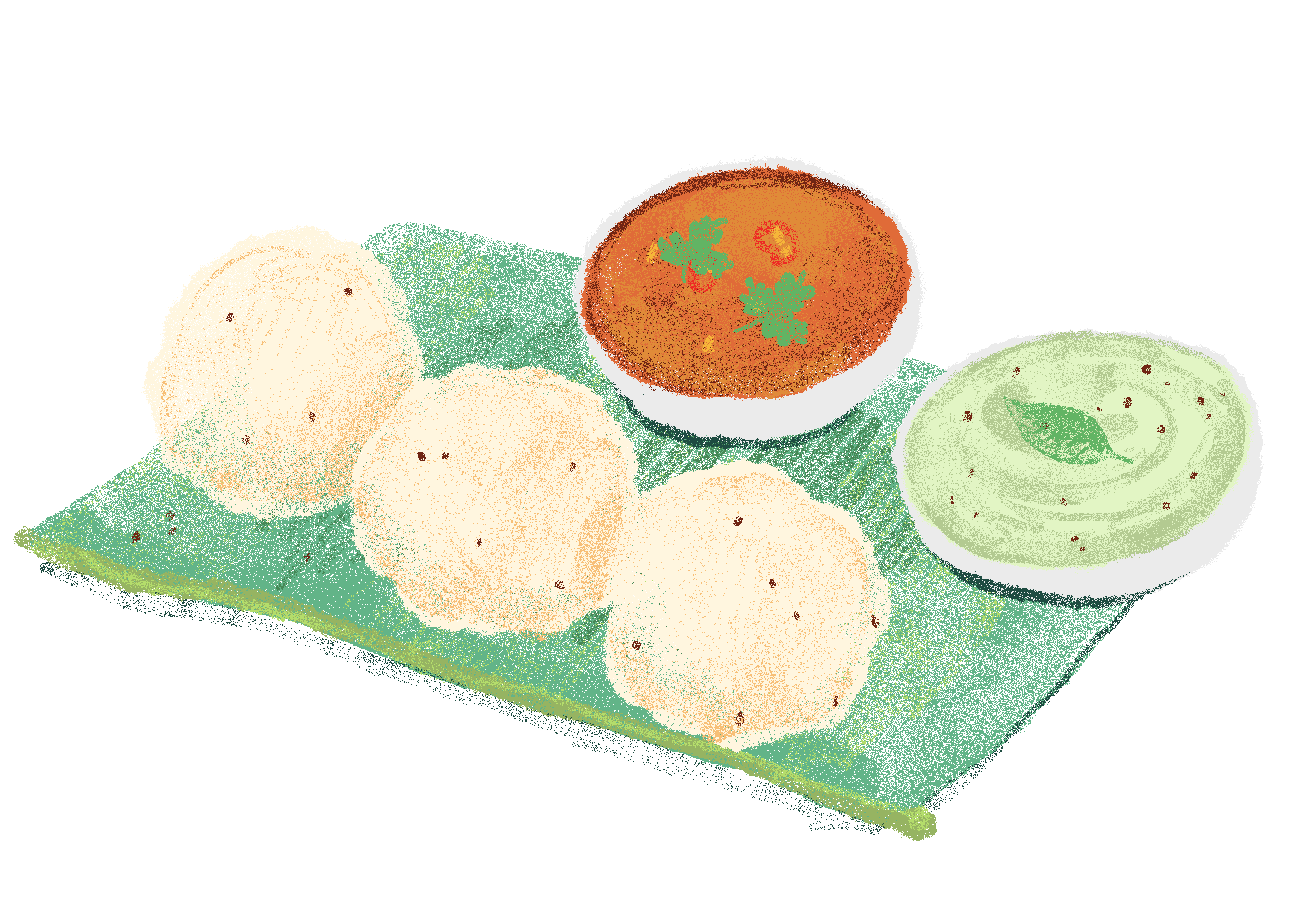
Drinking cold sweet tea has always been my preferred way to pass a warm summer’s day. Growing up in Georgia, sweet tea was one of my favourite treats as a young child. While seemingly every Southern household had a pitcher of the sugary beverage in the fridge, ready to be enjoyed at any time, now that I live in Montreal, I have to brew sweet tea myself. As adults, it’s these specific foods and drinks that help us remember our families, even when we move far away from our hometowns. Having the dishes we grew up with not only reminds us of our childhood, but also keeps us connected to our roots. With limited options in Montreal to enjoy food from back home, however, finding these dishes can require a bit of effort.
Kayin Queeley, a case manager for the Office of the Dean of Students, grew up eating the national dish of Saint Kitts and Nevis: Saltfish and dumplings served with potatoes, breadfruit, and fried plantains. Now living in Longueuil, most of Queeley’s family remains in Saint Kitts and Nevis, making it all the more important for him to continue cooking Caribbean cuisine with his wife and daughter.
“In many ways, when I’m cooking something that my mom cooked, [that] I saw my aunt cook or my brother cook, it’s like sharing that experience, even though they’re not there,” Queeley said. “So really, it just means keeping my culture alive.”
Recreating the dishes made by loved ones is an integral means of staying connected to home, but there are limited options in Montreal. Restaurants might not serve regionally specific dishes, and attempting to make it yourself may require travelling out of the way to buy ingredients at specialty stores. Yet, this does not mean that finding echoes of familial dishes is entirely impossible.

“[Montreal] is different, but I can find [Kittian food] here. I [just] have to seek it out,” Queeley said. “You want to be able to find food that resonates to your home if you can, and I can find it, but it takes work.”
For Ananya Nair, U3 Arts, just because a dish is readily available does not mean it will live up to expectations. Growing up in Mumbai, Nair’s mom cooked dosa breakfasts every morning. Now that she lives in Montreal, finding South Indian food up to par with her mom’s home cooking is challenging.
“I don’t even try to eat [idlis] at restaurants because I know that my mom has this really weird technique that she uses so that they’re pillowy soft, [and she makes them] with an interesting texture,” Nair said. “I know that I actively avoid ordering idlis in Montreal just because I know that nobody [else] can get that perfection.”
The general busyness of student life in Montreal means that Nair only eats dosa from time to time now. Weighted with the memory of the past, it takes a regrettably significant amount of time and effort to reconnect with home-cooked fare that was once so readily available. As adults, we come to realize what we took for granted when we still lived in our family homes.
“I don't have time to put in the effort and cook the way my mom used to cook,” Nair said. “So going back home is always such a privilege because I know that she wants to feed me and make these really good things [when I’m there].”

Preparing dosa is a fairly labour intensive process: To make the batter, rice and lentils need to be blended into a flour with a wet grinder and then fermented overnight. Cooking up sambar to serve with the dosa adds more steps and more ingredients that need to be processed before the batter is finally cooked on a griddle.
“If I tried really hard, I could make [dosa like that],” Nair said. “But you can buy ready-to-cook mixes for the flour used to make dosa. [However,] nothing does justice to a freshly cooked dosa with sambar and all the other things that go along with it."
While the amount of work required to prepare dosa may deter those with busy schedules, several restaurants throughout the city specialize in serving dosa, along with other South Indian staples. Yet with the ongoing pandemic, dining in a restaurant is not currently a viable option and some entrees simply aren’t meant to be served from a styrofoam delivery container.
“A dosa cannot be had as a takeout when you do takeout, it's like [the dosa] loses all its essence,” Nair said. “And so I don't know what's up, but I can't find good dosa right now, and it's making me generally a little sad.”
With people coming from all around the world to live in and visit Montreal, it is no surprise that the city plays host to a sizable food scene. On average, there is a restaurant for every 373 residents of the city. According to the 2016 census, immigrants make up 23.4 per cent of the Montreal metropolitan area’s population. Considering that this statistic excludes second- and third-generation immigrants and non-permanent residents of Canada, such as international students and migrant workers, the city’s demographics are even more cosmopolitan. Yet Montreal’s food culture does not adequately reflect this reality.
White restaurateurs continue to hold the lion’s share of resources in the food industry as a whole, and several restaurants recently set to open in the city have struggled to plate non-Western cooking without succumbing to cultural appropriation. The Tourisme Montreal website's top posts about eating out in the city further emphasize microbreweries and French and Italian cuisine, with poutine, bagels, and smoked meat receiving special mention as the city’s “staples.” Serena Lisus-Reiter, U3 Arts, grew up in an Israeli and South African Jewish household in Toronto and found that moving to Montreal was underwhelming in this regard.

“You have so many more options of things to eat [in Toronto],” Lisus-Reiter said. “I feel like there's much more of a celebration of individual [national] cultures and individual ethnic cultures and cooking in Toronto than there is here [....] But the ‘good’ food here is mostly, like, French bistros or whatever.”
As a McGill student living in the Plateau, Lisus-Reiter generally stays within her neighbourhood. She finds that typically Jewish foods and ingredients are only available in more niche specialty stores.
“In a grocery store [or bakery] in Toronto, I could easily find a challah, but here I can't find that anywhere that’s not specifically a kosher bakery,” Lisus-Reiter said.
There are plenty of kosher stores and Jewish businesses further north in the Mile End and Outremont, but it is no small irony that in the Plateau—which was once the bustling centre of Montreal’s Jewish immigrant communities—Jewish foodstuffs have become difficult to acquire. While establishments such as Schwartz’s Deli and Hof Kelsten maintain a visible Jewish presence in the Plateau, many classic restaurants that once held a steady place in the neighbourhood have gone. Moishes Steakhouse shuttered their location on Boulevard Saint-Laurent in May, and the Museum of Jewish Montreal’s Fletcher’s Cafe is closed indefinitely due to the pandemic. As the economic circumstances of living in Montreal continue to change, long-term residents of the neighbourhood have been priced out of the rental market, and the Plateau and the Mile End’s food scene has become increasingly mainstream over the decades.
Because Montreal is a major urban center, food for most people—whether in a restaurant or at the grocery store—is typically not locally sourced.
“I always tell my friends that the food [in Montreal] is grown different,” Queeley said. “Because [back] home, there is more organic nature. We see the boats come to the shore with the fish that was just caught out of the ocean. When I get fish here, it’s probably come a long way.”
Although it is not impossible to obtain fresh and locally-sourced ingredients in Montreal, Queeley finds in general that ingredients in St. Kitts have a unique flavour.
“I do miss the things [that] we took for granted,” Queeley said. “Like if we wanted to do a goat stew, my mom knew somebody who was selling goats [...] or on Saturdays we'd go down to the market and the meat is right there [....] But I think the nature of [living on] a small island [is] being able to see where that food is coming from.”
While Montreal’s food scene can leave quite a bit to be desired, this does not prevent home cooks from embarking upon their own missions to recreate their family cooking traditions. Nair admits that she is not the greatest cook when it comes to South Indian cuisine, but sometimes she’ll add podi—a dry spice powder that her mother and grandmother give her boxes of every time she is back in Mumbai—to make dosas from ready-to-cook mixes passable. For Queeley, barbecue cooking brings back memories of seeing and smelling the smoke from grilled meats that hung in the air in St. Kitts year-round. Lisus-Reiter has worked on perfecting her grandfather’s signature cardamom chicken curry over the years.
“When he would make it [...] everybody would be like, ‘Oh, papa’s making curry’ and everyone would get really excited, and it would be a really special event,” Lisus-Reiter said. “Since he died, I think I'm the only person in my family who's been remaking it [after] my grandma gave me the recipe.”

Although Lisus-Reiter confesses that she cannot make the curry taste quite like her grandfather could, the memories associated with the dish itself never change.
“Every time I make it, sometimes I put way too much of something or not enough of something else,” Lisus-Reiter said. “But even if the taste is off, the smell is always the same. It’s always cardamom, and it always reminds me of [my grandpa].”
Being a university student often implies relying on a ramen noodle diet—and budget. However, taking the time to make food that is special to us can revive memories of past people and places, bringing them back into our present. While moving away from the family home can be a rite of passage, so too is learning to cook for yourself. Once you take the time to find your niche in Montreal, developing your cooking style might help to one day share the passion and care given to the dishes of your own childhood with your loved ones now and in the future.
“The fact [is] that I am replicating some of [the food my mom used to cook] and keeping that culture and those practices and those customs alive. For me, it's great,” Queeley said. “I think as any parent, you want your kids to eat, but it feels good when they actually like the stuff that you're cooking.”